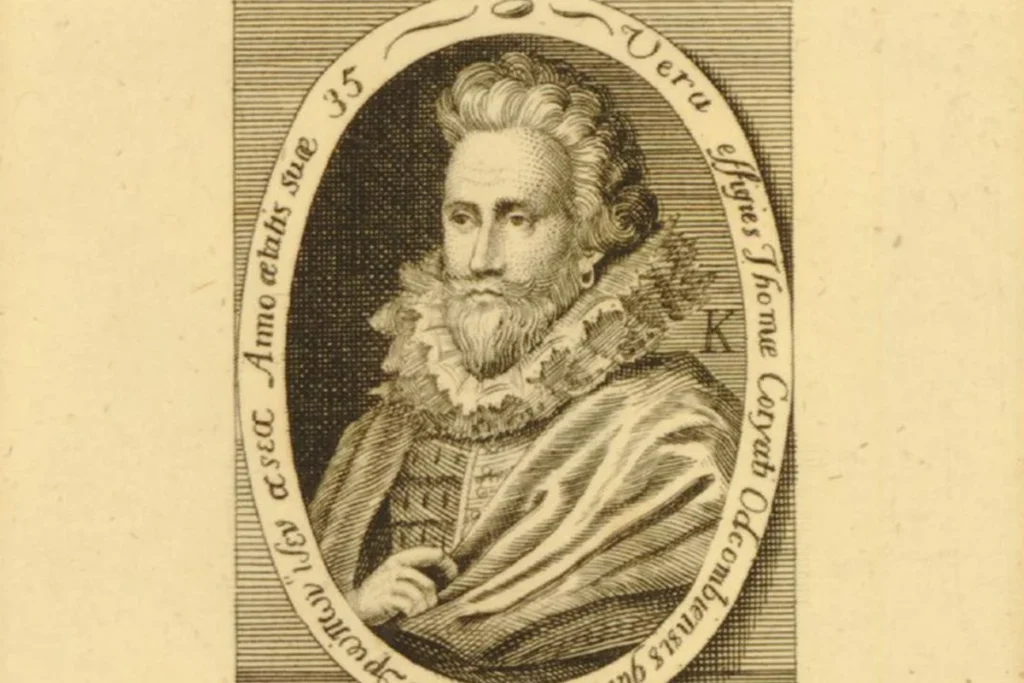The First Solo Traveler in History: Sir Thomas Coryat
Introduction
English aristocrat and adventurer Sir Thomas Coryat was the first to backpack across Europe in the early 17th century. Coryat’s travelogue “Coryat’s Crudities,” published in 1611, is considered one of the earliest English-language travel books. It offers a unique glimpse into the Europe of the time and paves the way for future generations of travelers.
Coryat’s courage, colorful personality, and the fact that he traveled the world with a backpack without being an aristocrat have made him an idol in the eyes of today’s backpackers.
Who Is Coryat?
Coryat was born in Odcombe, Somerset, attended Westminster and the University of Oxford, and subsequently joined Prince Henry’s household. In 1608, he traveled France, Italy, and Germany, covering over 2,000 miles in a single pair of shoes hung in Odcombe Church until 1702 and became known as “the thousand-mile shoes.” He wrote a hilarious account of this in Coryat’s Crudities Hastily Gobbled Up (1611), which included commendatory lines from numerous current writers. A sequel, Coryat’s Crambé, or Colewort Twice Sodden, followed. The following year (1612), Coryat embarked on another expedition to Greece, Egypt, and India, from which he never returned. He died in Surat. Despite being weird and egotistical, Coryat was a perfect observer.

His First Travels
He likely inherited some small property upon his father’s death, for within a year of that event, he had decided to embark on his journey. He sailed from Dover on May 14, 1608, and used ordinary means of transportation, sometimes in a cart, sometimes in a boat, and sometimes on horseback, to pass through Paris, Lyons, and other French towns. He crossed the Mont Cenis in a chaise à porteurs on June 9 and arrived in Venice on the 24th.
He stayed in Venice until August 8, when he began his journey home on foot. He crossed the Splugen, passed through Coire, Zurich, and Basle, and then sailed down the Rhine, stopping at Strasburg and other places, finally arriving in London on October 3, having traveled by his own account 1,975 miles, much of it on foot,[2] and visiting 45 cities in 5 months, “five in France, one in Savoy, thirteen in Italy, one in Rhoetia, three in Helvetia.
His Other Travels
In 1612, Coryat resumed his travels. Before leaving, he returned to his hometown and made a farewell speech at the Sunday cross, announcing his plan to remain out of sight for ten years.
He hung the shoes he had worn in Venice in the church at Odcombe. They had already become famous and were depicted in a comic engraving tied together with a laurel wreath. They are an example of some of the comic verses of Henry Peacham, author of The Complete Gentleman, included in the “Panegyricke Verses” appended to Crudities. The shoes were still hanging in Odcombe Church at the beginning of the 18th century.
Coryat, As a Writer
Occasionally, when he had the opportunity, he sent letters to his friends. Some of these letters were published in 1616 under the title Letters from Asmere, the palace of the Great Mongol, to Several Eminent Persons in England; a well-drawn and well-executed engraving used as a preface to these letters shows him on an elephant.
His last letter was printed in 1618. Purchas also wrote other writings in his book “Pilgrimes”, published in 1625.
In the chapters where Coryat deliberately avoided sarcastic, humorous language, he wrote about the main cities of 17th-century Europe understandably and truthfully.
Coryat’s books are not reprinted today, given that his travel books broke sales records during his lifetime.
Coryat’s Adventure and Travel Journal
Coryat’s travel journal, published as “Coryat’s Crudities,” provides a detailed account of his journey, offering insights into the cultures, landmarks, and experiences he encountered during his travels. It serves as a valuable historical document, shedding light on the challenges and excitements of European travel during the early 17th century.

Coryat’s Legacy and Impact on the Future
Sir Thomas Coryat’s journey continues to inspire travelers today. His courage, curiosity, and pioneering spirit have left a lasting legacy, influencing countless adventurers who seek to explore the world. Additionally, Coryat’s travelogue remains an important historical and cultural document, preserving a snapshot of European travel during his time for future generations to appreciate and learn from.
Inspired Works by Coryat’s Journey:
The Coryat: A Voyage to the Seven Seas:
A documentary film inspired by Sir Thomas Coryat’s travels. Following Coryat’s route, the film brings his experiences to the modern world.
Coryat’s Crudities:
Hastily Gobled Up in Five Moneths Travels in France, Savoy, Italy, Rhetia Commonly Called the Grisons Country, Helvetia Alias Switzerland, Some Parts of High Germany and the Netherlands; Newly Digested in the Hungry Aire of Odcombe in the County of Somerset, and Now Dispersed to the Nourishment of the Travelling Members of this Kingdome” – A book written based on Coryat’s travel notes, providing a detailed account of his experiences.
Coryat’s ‘Caveat’ to His ‘Crudities:
Or, Coriat’s Conceipts, Concerning His Cariage Into France, M. Britan, and Ireland, &C” – Another book Coryat wrote, offering recommendations and warnings based on his travels.










